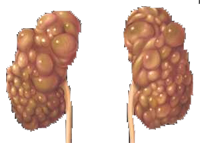ADPKD CLINICAL TRIALS
Click for 54 PKD clinical trials.
POTASSIUM CITRATE TRIALS WITH PKD
Still waiting for PKD potassium citrate trials to begin, the profoundly detailed work begun by PKD researcher – George Tanner PhD, bioPOTASSIUM CITRATE INTAKE IMPROVES RENAL FUNCTION IN RATS WITH POLYCYSTIC KIDNEY DISEASE alkalinity is truly key.
2010 saw many alkaline Potassium Citrate Clinical Trials, one with a positive outcome for reducing GFR in Chronic Kidney Disease and another with dialysis patients.

CRISP STUDY
This was a hallmark trial determining that it was kidney blood flow that was the earliest indicator of a decline in PKD. CRISP 2 Study continues.
PKD EVEROLIMUS - Efficacy, Safety and Tolerability of Everolimus in Preventing End-stage Renal Disease in Patients with ADPKD
Intervention: Drug -- Everolimus
Sponsor: Novartis
Study Phase: III
Status: Recruiting
Enrollment goal: 300
Description: To evaluate the anti-proliferative drug Everolimus as a means to slow disease progression in PKD by measuring total kidney and cyst volumes and changes in renal function. Website
Contact: Novartis, Freiburg, Germany 41-61-324-1111
Endothelial Dysfunction in polycystic kidney disease.
Observational: Looking for patients with early polycystic kidney disease i.e., preserved kidney function and normal blood pressure.
Sponsor: NIH
Status: Recruiting
Enrollment goal: 50
Description: To determine whether PKD, in the absence of high blood pressure and with preserved kidney function, is associated with cardiovascular risk factors such as endothelial dysfunction.
Contact: Vandana Menon, M.D., Ph.D., at 617-636-8791.
PKD PAIN Study - Polycystic kidney disease pain Study
Intervention: Procedure: Videothracoscopic Splanchnicectomy (VSPL)
Sponsor: Mayo Clinic
Study Phase: II
Status: Recruiting
Enrollment goal: 20
Description: To evaluate the effectiveness of VSLP procedure for pain management Website
Contact: Beverly Tietje at 507-255-0401 or Tietje.beverly@mayo.edu
PKD RAPAMYCIN - Pilot Study of Rapamycin as Treatment for polycystic kidney disease.
Intervention: Drug -- Rapamycin
Sponsor: The Cleveland Clinic
Study Phase: I & II
Status: Recruiting
Enrollment goal: 30
Description: To compare the effects of an anti-proliferative, anti-angiogenesis and tumor-progression-blocking agent on disease progression in polycystic kidney disease. Due to the intensive and frequent testing schedule, enrollment is limited to local patients only. Website
Contact: Susan Wirth at 216-444-0124 or wirths@ccf.org
PKD STATIN - Effect of Statin Therapy on Disease Progression in polycystic kidney disease
Intervention: Drug -- Pravastatin
Sponsor: University of Colorado at Denver and Health Sciences Center
Study Phase: III
Status: Recruiting
Enrollment goal: 100
Description: To determine the effect of pravastatin treatment on renal and cardiovascular disease over a 3-year study period in children and young adults aged 8-21 years with polycystic kidney disease. Website
Contact: Melissa Cadnapaphornchai, M.D. at 303-724-1690 or pkd.nurse@uchsc.edu
Linda Perkins at 303-724-1690 or pkd.nurse@uchsc.edu. You may also call toll-free at 1-877-765-9297.
PKD SODIUM - The Effect of High and Low Sodium Intake on Urinary Aquaportin-2 in polycystic kidney disease
Intervention: Drug -- High or low sodium diet
Sponsor: Holstebro Hospital, Denmark
Status: Recruiting
Enrollment goal: 25
Description: To examine the effect of high and low diets on kidney function and on hormones that affect the kidney. Website
Contact: Carolina Cannillo, M.D. at 1145099125428 or cacan@ringamt.dk
PKD BLOOD PRESSURE - CCB Safety Study in Treatment of Hypertension in polycystic kidney disease
Intervention: Drugs -- Candesartan; Candesartan Cilnidipine; Candesartan non-calcium channel blocker (CCB)
Sponsor: Kyorin University, Japan
Study Phase: IV
Status: Recruiting
Enrollment goal: 150
Description: To evaluate the safety and efficacy of calcium channel blocker Candesartan in treatment of hypertension in polycystic kidney disease patients. Website
Contact: Eiji Higashihara, M.D. at 81-422-47-5511, ext. 5813 or ehigashi@kyorin-u.ac.jp
PKD WATER as Therapy in Autosomal Dominant Polycystic Kidney Disease
Intervention: Water Prescription
Sponsor: University of Kansas University
Status: Recruiting
Enrollment goal: 10
Description: To formulate a water prescription for use in clinical trials to determine the effect of sustained diuresis on the progression of polycystic kidney disease. Enrollment is limited to local patients only. Website
Contact: Connie Wang, M.D. at 913-588-6074 or cwang@kumc.edu
PKD WATER High Water Intake to Slow Progression of Polycystic Kidney Disease
Contact: Irina Barash, M.D. (212) 263-5851 irina.barash@nyumc.org
Locations
New York University Langone Medical Center Recruiting
New York, New York, United States, 10016
Contact: Irina Barash, M.D. 212-263-5851 irina.barash@nyumc.org
Sponsors and Collaborators New York University School of Medicine
POLYCYSTIC LIVER DISEASE CLINICAL TRIALS
click for new PLD trials
PLD SOMATOSTATIN in Polycystic Kidney: A Long-term Three Year Follow-up Study
Intervention: Drug -- Long-acting somatostatin, also helpful for liver cysts
Sponsor: Mario Negri Institute for Pharmacological Research
Study Phase: III
Status: Recruiting
Enrollment goal: 66
Description: To compare the effects on disease progression of a three year treatment regimen using long-acting somatostatin or placebo in patients with polycystic kidney disease and normal renal function or mild to moderate renal insufficiency. Website
Contact: Norberto Perico, MD at 0039 035-45351 or perico@marionegri.it
PLD OCTREOTIDE in Severe Polycystic Liver Disease - enrollment closed
Intervention: Drug: Octreotide (long-acting somatostatin)
Sponsor: Mayo Clinic; Novartis
Study Phase: II & III
Status: Recruiting
Enrollment goal: 42 - enrollment closed
Description: To evaluate the effect of Octreotide LAR on liver volumes of patients with severe polycystic liver disease who are not candidates for or decline surgical treatments such as liver cyst fenestration or liver transplantation.
PLD LANREOTIDE as Treatment of Polycystic Liver Disease
Intervention: Lanreotide
Sponsor: Radboud University
Study Phase: II & III
Status: Active, but not recruiting
Enrollment goal: 38
Description: To assess the efficacy of lanreotide in controlling total liver volume in patients with polycystic livers.
ARPKD Current Clinical Trials
Evaluation of autosomal recessive polycystic kidney disease and Congenital Hepatic Fibrosis
Observational
Sponsor: National Human Genome Project (NHGRI)
Status: Recruiting
Enrollment goal: 200
Description: To collect comprehensive data on kidney and liver disease in autosomal recessive polycystic kidney disease/CHF and follow patients over time to provide the groundwork for more focused studies and novel therapeutic interventions. Website
Contact: Patient Recruitment and Public Liaison Office at 1- 800-411 1222 or prpl@mail.cc.nih.gov
• Chronic Kidney Disease in Children Prospective Cohort Study (CKiD)
Observational
Sponsors: National Institute of Diabetes and Digestive and Kidney Diseases (NIDDK), National Institute of Neurological Disorders and Stroke (NINDS), National Institute of Child Health and Human Development (NICHD) and National Heart, Lung, and Blood Institute (NHLBI)
Status: Recruiting
Enrollment goal: 540
Description: To determine the risk factors for decline in kidney function and to define how a progressive decline in kidney function impacts neurocognitive function and behavior; the risk factors for cardiovascular disease; growth failure and its associated morbidity. Website
Contact: Susan Furth, M.D., P.D. at 410-502-7964 or sfurth@jhmi.edu
Brad Warady, M.D. at 816-234-3812 or bwarady@cmh.edu
ARPKD GENETICS - The autosomal recessive polycystic kidney disease Clinical and Genetic Resource
Observational
Sponsors: National Institute of Diabetes and Digestive and Kidney Diseases (NIDDK)
Status: Recruiting
Enrollment goal: 200
Description: The Core has three primary objectives: To extend the observational study of autosomal recessive polycystic kidney disease initiated by the North American ARPKD Database; to provide a mechanism for genetic evaluation of patients with both classic ARPKD and unusual phenotypes of recessive PKD; and to develop educational tools for physicians and patients regarding the natural history, cause, development and effects of the disease, genetic testing, and clinical trials applicable to autosomal recessive polycystic kidney disease. Website
Contact: Lisa M. Guay-Woodford, M.D. at 205-934-7308 or lgw@uab.edu
Teresa Chacana, B.S.N. at 205-934-7649 or tchacana@uab.edu

TRANSPLANT Studies
Transplant Registry: Patients Who May Require Transplantation and Those Who Have Undergone Transplantation of Liver, Kidney and/or Pancreas
Observational
Sponsor: Virginia Commonwealth University
Status: Recruiting
Enrollment goal: 2,000
Description: To make a systematic review of medical records of patients (with patient consent) in the Virginia commonwealth University Health System who have received a liver, kidney or pancreas or who may require one and to enter the data into a secure database. Website Contact: Robert Fisher, M.D. at 804-828-2461
Cheryl Rodgers, BSN, RN 804-828-2463
|